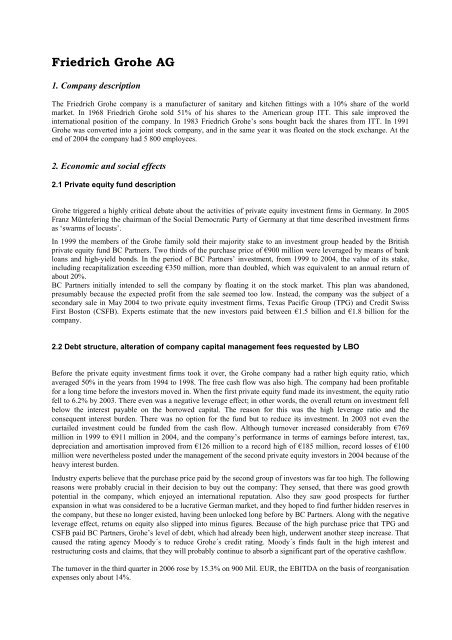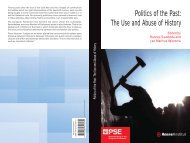Executive summary - Udo Bullmann
Executive summary - Udo Bullmann
Executive summary - Udo Bullmann
- No tags were found...
You also want an ePaper? Increase the reach of your titles
YUMPU automatically turns print PDFs into web optimized ePapers that Google loves.
Friedrich Grohe AG1. Company descriptionThe Friedrich Grohe company is a manufacturer of sanitary and kitchen fittings with a 10% share of the worldmarket. In 1968 Friedrich Grohe sold 51% of his shares to the American group ITT. This sale improved theinternational position of the company. In 1983 Friedrich Grohe’s sons bought back the shares from ITT. In 1991Grohe was converted into a joint stock company, and in the same year it was floated on the stock exchange. At theend of 2004 the company had 5 800 employees.2. Economic and social effects2.1 Private equity fund descriptionGrohe triggered a highly critical debate about the activities of private equity investment firms in Germany. In 2005Franz Müntefering the chairman of the Social Democratic Party of Germany at that time described investment firmsas ‘swarms of locusts’.In 1999 the members of the Grohe family sold their majority stake to an investment group headed by the Britishprivate equity fund BC Partners. Two thirds of the purchase price of €900 million were leveraged by means of bankloans and high-yield bonds. In the period of BC Partners’ investment, from 1999 to 2004, the value of its stake,including recapitalization exceeding €350 million, more than doubled, which was equivalent to an annual return ofabout 20%.BC Partners initially intended to sell the company by floating it on the stock market. This plan was abandoned,presumably because the expected profit from the sale seemed too low. Instead, the company was the subject of asecondary sale in May 2004 to two private equity investment firms, Texas Pacific Group (TPG) and Credit SwissFirst Boston (CSFB). Experts estimate that the new investors paid between €1.5 billion and €1.8 billion for thecompany.2.2 Debt structure, alteration of company capital management fees requested by LBOBefore the private equity investment firms took it over, the Grohe company had a rather high equity ratio, whichaveraged 50% in the years from 1994 to 1998. The free cash flow was also high. The company had been profitablefor a long time before the investors moved in. When the first private equity fund made its investment, the equity ratiofell to 6.2% by 2003. There even was a negative leverage effect; in other words, the overall return on investment fellbelow the interest payable on the borrowed capital. The reason for this was the high leverage ratio and theconsequent interest burden. There was no option for the fund but to reduce its investment. In 2003 not even thecurtailed investment could be funded from the cash flow. Although turnover increased considerably from €769million in 1999 to €911 million in 2004, and the company’s performance in terms of earnings before interest, tax,depreciation and amortisation improved from €126 million to a record high of €185 million, record losses of €100million were nevertheless posted under the management of the second private equity investors in 2004 because of theheavy interest burden.Industry experts believe that the purchase price paid by the second group of investors was far too high. The followingreasons were probably crucial in their decision to buy out the company: They sensed, that there was good growthpotential in the company, which enjoyed an international reputation. Also they saw good prospects for furtherexpansion in what was considered to be a lucrative German market, and they hoped to find further hidden reserves inthe company, but these no longer existed, having been unlocked long before by BC Partners. Along with the negativeleverage effect, returns on equity also slipped into minus figures. Because of the high purchase price that TPG andCSFB paid BC Partners, Grohe’s level of debt, which had already been high, underwent another steep increase. Thatcaused the rating agency Moody´s to reduce Grohe´s credit rating. Moody´s finds fault in the high interest andrestructuring costs and claims, that they will probably continue to absorb a significant part of the operative cashflow.The turnover in the third quarter in 2006 rose by 15.3% on 900 Mil. EUR, the EBITDA on the basis of reorganisationexpenses only about 14%.





